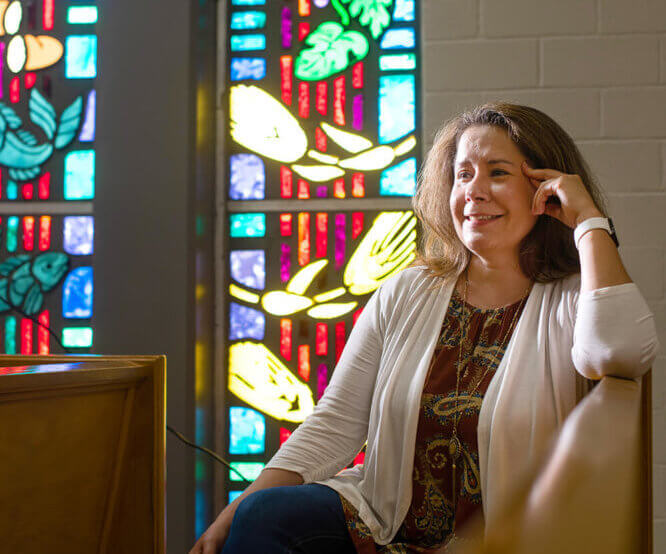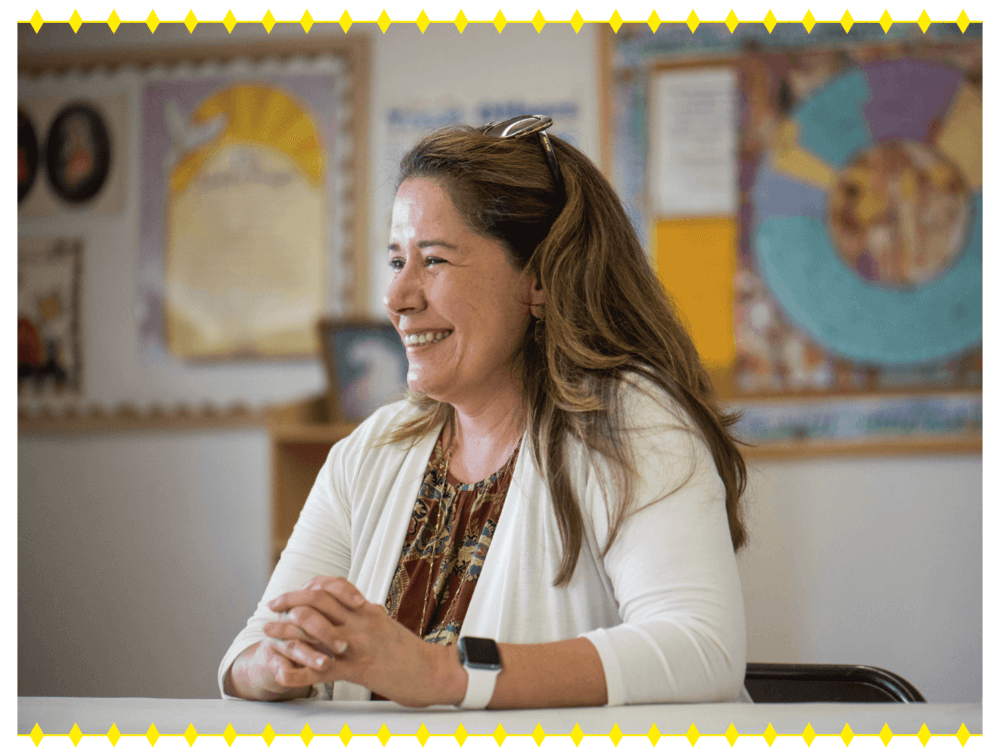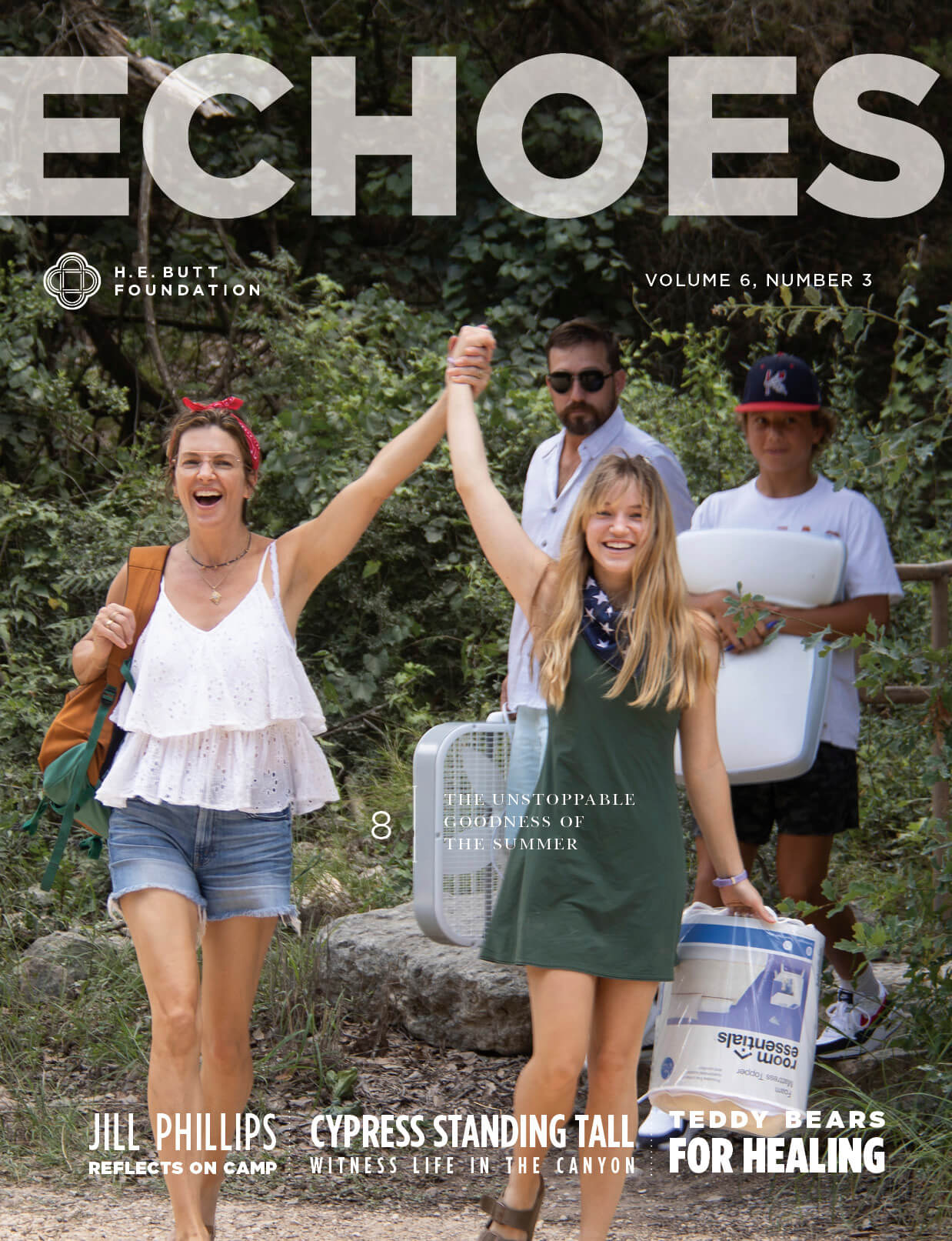

Virginia Mata’s Story Comes Full Circle—and Shatters Misperceptions Along the Way
Virginia Mata, 52, laughs as she recalls the time her family was driving back to Texas from Ohio, where they worked the fields one summer, and their car caught fire and burned down to the steel shell.
Another time, she got electrocuted while using a hazardous old-fashioned washing machine—she became stuck to it, then was thrown a few feet away when it was unplugged. Then there were the many times she and her sister, the youngest of 11 siblings, played in the drainage waters that would swell in their neighborhood during downpours. During one of the floods, her mom’s old station wagon almost got swept away.
Everyone in San Antonio knows about flash floods—“Turn Around, Don’t Drown” signs are familiar on certain roads. But in the West Side, a neighborhood established by Mexican Americans who were restricted from more resourced neighborhoods north of downtown, floods were far more commonplace.
“I remember as kids getting pulled out of that station wagon,” Mata said. “We were at the time like five or six, I think. But yeah, we didn’t know that was not normal.”
Mata says when you grow up experiencing poverty, “you accept it, normalize it, and blame yourself for it.” What seems normal at the time becomes absurd when you reflect back on it as an adult.
Mata speaks softly and with a kind of wisdom that comes from navigating barriers early in life. She’s also incredibly modest. The first time we talk, she asks why we would be interested in writing about her life. Later, she asks again.
I barely know her when she first asks the question. But I knew enough about her story to take a stab.
Mata is retired from two careers—one in federal law enforcement, and another as a lietenant commander in the Navy Reserves. Nowadays, she spends a lot of her time with COPS/Metro, a community organizing coalition that gathers people from churches, schools, businesses and unions to represent the needs of families and children. Over the last year, Mata and her COPS/Metro partners have spurred the City of San Antonio to create and invest in a workforce training program designed to support people seeking higher-paying jobs.
Retirement from her final job as a probation officer in Del Rio in 2018 brought her back to San Antonio, where she bought a house near Sea World that is still a close enough drive to her old stomping grounds. Those stomping grounds include Holy Family Church, Mata’s church growing up, which is also where COPS/Metro was born.
The coalition’s first fight, all those decades ago? Demanding that the city fix the West Side’s drainage issues.
Mata’s story is coming full circle.
“When I was young, I just always wanted to just succeed and make my mom proud,” Mata says. “I wanted to break the cycles of poverty and illiteracy in my family. I didn’t want to be just another statistic and I wanted my nieces and nephews to do better and to have a better childhood.”
When Mata was in the ninth grade, she asked her mother if she could drop out of school. No one in her family had gone past the ninth grade, and her mom had not even been allowed to attend school. Her mom left the choice up to her.
Mata was concerned that her mom could not really comprehend the gravity of the decision, and she decided to keep going. She and her twin sister became the first of their mother’s 11 children to finish high school. But the accomplishment was tainted by another family event that year when Mata’s 23-year-old brother was murdered. She still remembers going to the scene of the crime and seeing his bloody handprint and a hypodermic needle nearby. ”He was a hard worker,” she says, “but he struggled with addiction.”
When you grow up experiencing poverty, “you accept it, normalize it, and blame yourself for it.”
That traumatic experience inspired Mata to go even further than she had planned—not just to college, but to a school far from San Antonio: Texas Tech University.
Her mom told her she was crazy, Mata recalls. “I just told her, ‘Mom, you don’t have to do anything. All you have to do is drop me off at the Greyhound bus station, and I’ll figure it out from there.’ ”
College was an uphill battle. Mata got a couple of scholarships, but they weren’t much. She relied on student loans, which she smartly refinanced later in life using her car as collateral.
Mata grew up in 78237, which was once considered the far West Side, before development started flourishing around U.S. 151 past Loop 410. In Mata’s neighborhood, nearly half of people 25 and older—45.6%—don’t have high school diplomas. Only 3.7% have bachelor’s degrees, compared to 25.2% in San Antonio overall.
Texas Tech was a culture shock to a young woman who had never ventured far from her West Side parish. But meeting people from different backgrounds helped her understand the race of life—and how the race begins differently depending on where you come from.
“And some people are in the race at the starting line,” she says. “Some people are in that starting line with athletic legs, or maybe in a nice fancy car, while some people are crawling their way through it. And then there’s those people that don’t even know where the stadium’s at … Not just that they’re outside trying to get in, but they don’t even know there’s a stadium.
“A lot of people don’t realize the systemic issues that we have, because they are so embedded, so hidden from everyday life that people can’t see them,” she continues.
“It’s become so normalized, and our institutions normalize it—they tell people these things are their fault. In actuality, it’s not their fault. It’s just the way that everything was designed.”
She thinks back to her neighborhood’s flood waters.
“It occurred to me: Wow, so that was not a normal day. Because I remember as kids, we were always playing in the creeks by the water where it would flood down just like a couple of houses from our house. And I just thought that was normal. Like, ‘Oh, if it rains, we can go play in the creek.’” Never mind the danger and the damage being done to neighbors’ homes.
“[Our institutions] tell people these things are their fault. In actuality, it’s not their fault. It’s just the way that everything was designed.”
I know exactly what Mata is talking about, having spent my high school years living with my grandmother on Olga Street, not too far from where Mata grew up.
My grandmother Mary passed last year. To this day, the backyard floods when it rains.
“I mean, it’s an older neighborhood,” I tell Mata. “They just never got around to it. I don’t know if they ever will get around to it.”
“That sounds like just accepting it,” she responds. “I think we would be better off if we were just told the truth—the design of our neighborhood was flawed from the start. I’m not pointing fingers, because that does nothing to solve problems. I’m just saying we need to move forward with the truth, and we need to do better.”
Mata’s story is one of preconceptions. When she was a kid, she was surrounded by them. Now, she’s trying to shatter them.
Some American viewpoints say that poor people need to pull themselves up by their bootstraps. She did exactly that, but she doesn’t take credit for it. She credits the social programs and the kind gestures of others with opening her eyes to the possibilities when she was a kid.
Food stamps kept her household, composed of five siblings and her mom, from going hungry, although they still sometimes found themselves digging in the sofa for loose change at the end of the month.
A woman named Ms. Ramirez, Mata remembers, sold them their house for hardly anything. No bank was involved. Ms. Ramirez would come by the house to pick up the payments and often would drop off food and clothes during the same visit.
Later, when Mata was in college, Mata’s mom qualified for a program that rebuilt the house, which had holes in the ceiling and floors and no air conditioning nor heat. Her mom, who’s 90, still lives there today.
Another one of those social programs was a youth program known as Project SER, which led to her interning at Kelly Air Force Base one summer. While there, she met a secretary who told her, “Virginia, you’ll probably come back here and you’ll probably be my boss,” Mata remembers. “Those little comments stayed in my mind.”

She went from Memorial High School to Texas Tech to the University of Texas at San Antonio, where she got her master’s degree in public administration and is currently finishing a Ph.D. at the University of the Incarnate Word. All this time, she has also been giving back. She started her civilian career doing outreach to pregnant teenage girls at the Salvation Army. She also worked with the homeless as a city case worker and at the Battered Women’s Shelter before retiring as a supervisor in the federal probation office in Del Rio.
Now she’s helping create the curriculum for a youth leadership program for girls. Some of the participants will participate remotely from as far away as Kenya and Kosovo. But she’s also recruiting from Memorial and other schools where she has connections.
“That’s why I got into a life of public service. So now that I’m retired, I want to continue to work towards making this country a better country, making the world a better world,” she said. “In the smallest ways that I can, of course.”
![]()
B. T. Wilson’s Outdoor Ed program for sixth graders helped these students find the confidence to serve their communities.
Cypress trees line the Frio riverbanks, providing shade, respite, and inspiration now and for hundreds of years to come.
